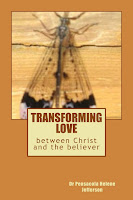TRANSFORMING INTIMACY
GOD IS YOUR CAREGIVER
“…that they might KNOW…..the only true God and
Jesus Christ…” (John 17:3)
 |
| Colosians 3:14 |
Therefore, the initial attachment between
infant and caregiver(s) becomes the template for attachment, for the infant,
throughout its lifespan and will remain a concrete way he or she is able to be
intimate in other close relationships. Another important fact to know about the
infant and caregiver attachment relationship is that it will demonstrate
mutuality. Mutuality is attachment in action, where infant and caregiver(s)
equally contribute to bonding and connecting behaviors.
 |
| MUTUALITY |
However, in order for a loving attachment
to take place, both the infant and the caregiver(s), preferably contribute to
the interactions in order to strengthen and reinforce this powerful, intangible
bond. The infant and caregiver(s) have different roles in the attachment
process, but both are equally important and necessary for bonding to actually
take place.
The caregiver, however, has the responsibility
of knowing and paying attention to the infant’s needs when he or she
“stimulates a response” from them. Mutuality in this phase is where the infant simply stimulates a response and the caregiver responds. The infant stimulates a response by
making vocal sounds, showing emotions, or through infant body language. The
caregiver(s) bestows a respond by calming, soothing, comforting, or touching
behaviors.
The caregiver(s) communicates to the
infant that it’s okay to have needs and those needs are important. The caregiver
joyfully and lovingly meets the infant’s needs. Eventually, as the infant
develops, the caregiver(s) begins to gently and lovingly teach the infant how
to regulate some of their own internal needs.
The caregiver helps the infant regulate
internal needs as a way to prepare them to self-regulate, when necessary, in
the future. The purpose of teaching an infant to self-regulate “some” of their own
internal needs is to teach them aspects of healthy, emotional independence; and
so they will have healthy (and not overly needy) relationships in the future.
 |
| INTERNAL NEEDS |
If the caregiver(s) does not meet the
infant’s, emotional or physical, needs; the quality of attachment will be severely
reduced. In addition, if the caregiver does not fully participate in the
initial mutuality relationship, the attachment will be dysfunctional at best.
And the God-given attachment ability, within the infant, is highly impaired and
the quality of his or her skills towards intimacy with another is seriously impacted.
Wherever the caregiver(s) and infant attachment
is broken, it will affect intimacy, for the infant, from that point going
forward. The infant will grow and develop experiencing attachment and intimacy
as untrustworthy, undependable, without empathy, without understanding, and not
mutually enriching.
God-given attachment abilities for the infant,
especially in regard to emotional needs, are locked away and are deemed to be
unreliable or of no use. An infant that locks away his or her God-given attachment
abilities for emotions will reject, ignore, or be totally unaware of attachment
opportunities.
These adult infant’s may be considered
emotional unavailable however, because of sin, most people can be considered
emotionally inept on some level. Even the best of parents, can damage the
infant and caregiver attachment if they don’t recognize the “gifted” bond for
what it was really meant to be.
Human attachment is better between infant
and caregiver (s) when God’s standard of love forms the bond. God’s love “….is the perfect bond of unity..” (Colossians
3:15 KJV). God’s love never fails and will outlast any other lesson the budding
infant will ever learn (1 Corinthians 13: 8, 13). If an person is trained from
an infant to go the way of loving attachments, even when he or she gets old
they won’t depart from it (Proverbs 22:6). If your child is taught the love of
God, within the infant/caregiver(s) attachment, “…great shall be [their] peace..” (Isaiah 54:13 KJV).
 | ||
| SENT TO LOVE AND BE LOVED |
 Children are said to be a heritage or
gift from God (Psalm 127:3) and we understand “every good gift, and every perfect is from above, and cometh down from
the Father of lights….” (James 1:17 KJV). Too often we see reasons for
having a baby from a very narrow perspective.
Children are said to be a heritage or
gift from God (Psalm 127:3) and we understand “every good gift, and every perfect is from above, and cometh down from
the Father of lights….” (James 1:17 KJV). Too often we see reasons for
having a baby from a very narrow perspective.
EXCERPT FROM THE CHAPTER
"GOD IS YOUR CAREGIVER" FROM
BY PENSACOLA H JEFFERSON




No comments:
Post a Comment